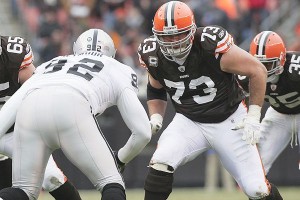
Like everything else, the rules disappear when Ogden is involved.
The game is won in the trenches, I know.
As we hit the halfway mark of the season, some teams are already thinking about next year, and in particular, the 2013 draft. If I was in charge of a bad team, and specifically, a bad passing team, I would try to avoid spending a lot of money or a high first round pick on a left tackle. This philosophy is more guideline than rule — if there is a can’t miss prospect there and/or you are underwhelmed with the other top prospects, then draft the tackle — but spending a high pick on an offensive lineman would be my move of last resort.
Let’s pretend for a few minutes that a top-five pick on a left tackle is going to give you Jake Long or Joe Thomas or Jonathan Ogden, and not Jason Smith or Levi Brown or Robert Gallery or Mike Williams. Now, why is having a star left tackle so valuable? The traditional theory goes that since the left tackle is response for protecting the quarterback’s blind side, he’s the most important member of your offensive line. The other corollary is that most star pass rushers play on the defense’s right side (and the offense’s left), amplifying the value of the left tackle.
When it comes to the running game, the left tackle is no more valuable than the right tackle, or (in some systems) any other members of the offensive line, for that matter. To make this a more straightforward analysis, let’s just stick to the passing game, even though obviously most elite left tackles are also very good at run blocking, which of course adds value.
On most passing plays, offensive linemen are basically the equivalent of fences, designed to prevent the opposition from getting to the quarterback. How useful is a fence that’s totally impenetrable on the left side but has a human-sized hole on the right? This isn’t just a snarky comment; an offensive line is often only as valuable as its weakest link. Which defense will get to the quarterback first: one facing five average linemen or one facing three average linemen, an All-Pro left tackle and the worst starting right tackle in the league? If you were a defensive coordinator, which group would you rather scheme against? To me, it’s a pretty simple question: you want to attack your opponent’s weakness, and an offensive line, like a fence or a chain, is only as strong as its weakest link.
Let’s put it another way. In what circumstances does an All-Pro left tackle add value over say, the 25th best starting left tackle in the league? I think those circumstances are basically limited to those plays where:
The All-Pro left tackle does his job, and the other four, five or six blockers do their job, and the quarterback makes the right read and an accurate throw, and the receiver makes the catch, and on this particularly play, the player(s) that was (were) blocked by the All-Pro left tackle would have gotten to the quarterback in time to prevent him from throwing and completing said pass had he (they) been blocked by a replacement-level tackle.
If you think there are a lot of ‘ands’ in that sentence, you’re right. If the other lineman don’t do their job, the star left tackle is meaningless. If the quarterback can’t make the right read or is inaccurate, the left tackle that blocks DeMarcus Ware doesn’t help his team (other than an incomplete pass being better than a sack or a rushed throw that turns into an interception). If the receiver drops the ball, the left tackle doesn’t provide any value. And if we’re talking about a player where the left tackle didn’t do anything that a replacement level linemen wouldn’t have done, then our star tackle has added no value, either.
[continue reading…]


